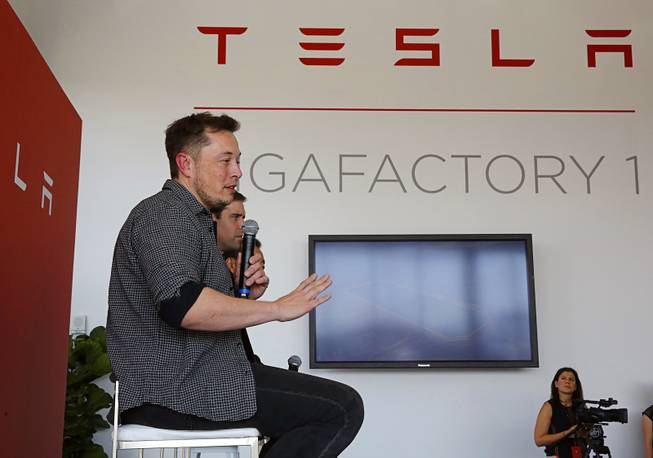
Rich Pedroncelli / AP
Elon Musk, CEO of Tesla Motors discusses the company’s new Gigafactory Tuesday, July 26, 2016, in Sparks.
Thursday, Aug. 4, 2016 | 2 a.m.
Tesla Motors said Wednesday that its losses deepened in the second quarter, but the electric-car maker pledged to expand production and improve the profitability of its vehicles.
The company said it lost $293.2 million in the quarter, on revenue of $1.27 billion. The loss was only slightly more than in the first quarter, but it greatly exceeded analyst forecasts and raised the pressure on Tesla to improve its factory output.
Tesla’s chief executive, Elon Musk, said the automaker was on track to build 50,000 vehicles in the second half of the year — despite missing its production targets in the first six months.
“I think our core business is actually doing quite well,” Musk said in a conference call with analysts. “We see demand being very strong for an average of 2,000 vehicles a week, and we are able to maintain production at that level.”
But Tesla’s chief financial officer, Jason Wheeler, admitted that production volumes in the first half of the year fell short of the company’s stated targets.
“We’re deeply disappointed at our delivery numbers,” Wheeler said.
No one expects Tesla to turn a profit anytime soon, given the scope of its ambitious expansion plans in the production of electric cars as well as the batteries that power them. That may be why the company’s stock barely ticked down in after-hours trading after the financial results were announced.
What worries investors and shareholders is that Tesla so far has been unable to consistently keep pace with its growth plans. And with Tesla proposing a merger with solar panel company SolarCity, analysts are increasingly wondering when its automotive business will become profitable.
The company delivered about 14,000 vehicles in the second quarter, missing its target of 17,000. Concerns about production are pressing because next year Tesla must begin filling orders for its coming, less expensive Model 3 sedan, which will be priced around $35,000.
The success of the company’s first two vehicles, the Model S and X — vehicles that sell for $70,000 or more — remains the linchpin of Musk’s vision for transforming Tesla into a sustainable-energy conglomerate. Steady growth in the car business has made it possible for Musk to broaden his reach into related industries.
Earlier this week, Tesla said its independent board members had approved the idea of the company’s acquiring SolarCity, in which Musk is a major investor. Tesla also is nearing completion of a new factory in Nevada that will produce batteries not only for its cars, but eventually for the storage of solar and wind energy for household use.
In addition, Musk recently revealed plans to expand Tesla’s product lineup to include electric trucks and buses. But the expansion plans cannot mask the challenges that Tesla faces on the assembly lines at its auto plant in California.
“While innovation and entrepreneurship are stronger than ever at Tesla,” said Clement Thibault, an analyst with Investing.com, “the company’s ability to smoothly and successfully translate these ambitions into mass produce — and more significantly serious revenues — remains unproven.”
In May, Tesla raised about $1.7 billion in a public stock offering designed to finance its growth plans. How that money is spent is critical to Musk meeting his production targets and satisfying the more than 300,000 preorders for the Model 3.
The company is also facing a new level of scrutiny beyond its financial condition and long-term ambitions. In June, federal auto safety regulators opened an investigation into the safety of Tesla’s Autopilot assisted-driving systems.
The inquiry by the National Highway Traffic Safety Administration is focusing on a May 7 fatal accident in Florida of a Model S sedan with its Autopilot system engaged. Another agency, the National Transportation Safety Board, is also investigating the role of self-driving technology in the crash.
The Securities and Exchange Commission is also looking into whether Tesla possibly violated securities laws by failing to disclose the fatal crash in documents related to its public stock offering May 18.
Musk and Tesla have said Autopilot is a lifesaving technology and have resisted calls by critics, including Consumer Reports magazine, to disable the system.

Join the Discussion:
Check this out for a full explanation of our conversion to the LiveFyre commenting system and instructions on how to sign up for an account.
Full comments policy